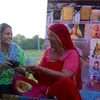Independence Day: These women entrepreneurs are harnessing local talent for their made-in-India D2C brands
India’s 75th Independence Day is also a day to celebrate entrepreneurs leveraging the country’s talent and entrepreneurial infrastructure. Here’s a look at five women who are living by the made-in-India mantra.
The idea of freedom has been subjective – and subject to evolution - for women in independent India.
Societal roles have been rather shapeshifting – they encompass bright and promising students, busy professionals, and wives and mothers who focus on household matters. Many women continue to be either confined to one such role or dabble with multiple roles, depending on varying progressiveness across the country.
Then there are those who are living with a newfound identity - of an entrepreneur - in the last decade or so in both, rural and urban India.
Studies have shown that women, who comprise half of India’s population, have huge potential to contribute to the country’s GDP and employment through entrepreneurship.
On India’s 75th Independence Day, HerStory takes a look at women entrepreneurs who are making from India, for India.

(From L to R clockwise) Aditi Motla and Aashna Sangani Parikh, Co-founders of Tipsyfly; Pritika Singh, Founder of Mohh; Ashini Shah, Co-founder of Zeezeezoo; Tanushree Jain, Founder of Nushaura; Vanya Chandel, Founder of Forfurs
Tipsyfly
Aditi Motla, an applied jewellery graduate from Gemological Institute of America, saw that India’s fashion jewellery market was highly fragmented and tapped the market opportunity by starting Tipsyfly, an affordable everyday wear jewellery brand.
Founded in 2015 along with Aashna Sangani Parikh and Ashish Virwani, the Mumbai-based venture began its journey by sourcing products from manufacturers in China but became a purely made-in-India brand in 2018.
Since then, it has been working with about eight artisan clusters in Mumbai, Jaipur, and Kolkata. This has given Aditi greater control over inventory and the manufacturing process. As everything is made locally, it allows the team to tap the latest trends with quicker turnaround times. The brand brings out three to four collections every month.
Apart from selling on its own website and ecommerce platforms like Amazon and Flipkart, Tipsyfly has an offline retail presence via several stores in Mumbai.
Forfurs
From her hometown Kanpur, known as the leather city of the world, Vanya Chandel began exporting equestrian products to markets in the UK. In 2018, the struggle to get quality toys and accessories for her pet dog Hugo in India led to the start of Forfurs, a direct-to-consumer brand offering a range of premium pet care accessories for cats, dogs, and horses.
With a better understanding of market needs as a pet parent herself, she began working from a 3,000 sq ft workshop in Sarojini Nagar, Kanpur, with a team of five people. With most demand coming from metro cities, the entrepreneur is looking to launch a range of economical products to tap the market in Tier II and Tier III cities.
Through platforms likeAmazon, Flipkart, Snapdeal, and its own website, Forfurs sells about 2,000 products per month and has clocked a revenue of Rs 60 lakh in FY21.
Nushaura
Founded by social entrepreneur Tanushree Jain, Jaipur-based Nushaura’s twin aims are to promote environmental protection and women empowerment. The for-profit social venture works with more than 250 women artisans in rural Rajasthan and sells a wide range of handmade sustainable utility products like aromatherapy candles, soaps, and masks.
Priced between Rs 99 and Rs 2,000, Nushaura products are available on most ecommerce platforms, including Amazon, Flipkart, and Brown Living. The brand is also available in international markets like Canada, France, Germany, the US, and the UK.
Through its B2B model, the startup has worked with over 50 companies, including Gaia Conscious, Gyanjee Caterers, and other local corporate offices.
Tanushree has had her share of challenges in pursuing entrepreneurship in a patriarchal society. This led her to sign up for one mission: to empower women in rural areas to become independent. It also provides training on leadership, decision-making, and conflict resolutions.
Mohh
After quitting a cushy corporate job as a marketing professional in January 2020, Pritika Singh took the entrepreneurial plunge to build Mohh, a design-forward, direct-to-consumer furniture business.
The second-generation entrepreneur leveraged the family business’s existing infrastructure and factory, put together a team of 12 people, including professional infrastructure designers, and launched it online.
Apart from initial hiccups due to the pandemic, Mohh managed to introduce a range of products, including user-friendly study and work table sets, amidst the new normal of remote working.
The young entrepreneur also focuses on sustainable solutions in home décor and furniture. All furniture is completely plastic-free, and some options are created by upcycling wood and metal from factory scrap.
Zeezeezoo
Ashini Shah and Rahil Shah founded D2C baby apparel brand Zeezeezoo in 2016. Based in Vadodara, the brand works with creative illustrators, vendors, and manufacturers in India to introduce made-in-India apparels for babies and children up to the age of four.
With relevant themes based on Indian traditional occasions and Bollywood, the venture started with the NRI diaspora in mind but has found a larger market within India, which contributes to 60 percent of its total revenue.
Bootstrapped with Rs 35 lakh so far, it offers more than 200 designs and customised options priced between Rs 200 and Rs 899. Zeezeezoo products are available on its website and Amazon.
YourStory’s flagship startup-tech and leadership conference will return virtually for its 13th edition on October 25-30, 2021. Sign up for updates on TechSparks or to express your interest in partnerships and speaker opportunities here.
For more on TechSparks 2021, click here.
Applications are now open for Tech30 2021, a list of 30 most promising tech startups from India. Apply or nominate an early-stage startup to become a Tech30 2021 startup here
Edited by Teja Lele












